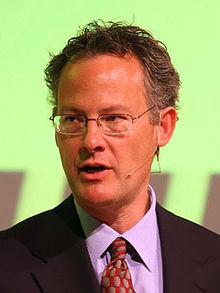Nicholas G. Carr
American writer
Nicholas G. Carr (born 1959) is an American writer who has published books and articles on technology, business, and culture.

Quotes
edit- Today, no one would dispute that information technology has become the backbone of commerce. It underpins the operations of individual companies, ties together far-flung supply chains, and, increasingly, links businesses to the customers they serve. Hardly a dollar or a euro changes hands anymore without the aid of computer systems.
- Why IT Doesn't Matter Anymore, Harvard Business Review, June 9, 2003.
- In the long run, though, the greatest IT risk facing most companies is more prosaic than a catastrophe. It is, simply, overspending. IT may be a commodity, and its costs may fall rapidly enough to ensure that any new capabilities are quickly shared, but the very fact that it is entwined with so many business functions means that it will continue to consume a large portion of corporate spending.
- Why IT Doesn't Matter Anymore, Harvard Business Review, June 9, 2003.
- Worrying about what might go wrong may not be as glamorous a job as speculating about the future, but it is a more essential job right now.
- Why IT Doesn't Matter Anymore, Harvard Business Review, June 9, 2003.
- By putting the means of production into the hands of the masses but withholding from those same masses any ownership over the product of their work, Web 2.0 provides an incredibly efficient mechanism to harvest the economic value of the free labor provided by the very, very many and concentrate it into the hands of the very, very few.
- "Web 2.0lier than thou," Rough Type, October 23, 2006.
- The kind of deep reading that a sequence of printed pages promotes is valuable not just for the knowledge we acquire from the author's words but for the intellectual vibrations those words set off within our own minds. In the quiet spaces opened up by the sustained, undistracted reading of a book, or by any other act of contemplation, for that matter, we make our own associations, draw our own inferences and analogies, foster our own ideas…. If we lose those quiet spaces, or fill them up with 'content,' we will sacrifice something important not only in our selves but in our culture.
- Is Google Making us Stupid in The Atlantic, July 2008.
- ...media are not just passive channels of information. They supply the stuff of thought, but they also shape the process of thought. And what the Net seems to be doing is chipping away my capacity for concentration and contemplation. My mind now expects to take in information the way the Net distributes it: in a swiftly moving stream of particles. Once I was a scuba diver in the sea of words. Now I zip along the surface like a guy on a Jet Ski.
- Is Google Making us Stupid in The Atlantic, July 2008.
- What the Net does is shift the emphasis of our intelligence, away from what might be called a meditative or contemplative intelligence and more toward what might be called a utilitarian intelligence. The price of zipping among lots of bits of information is a loss of depth in our thinking.
- Is Google Making us Stupid in The Atlantic, July 2008.